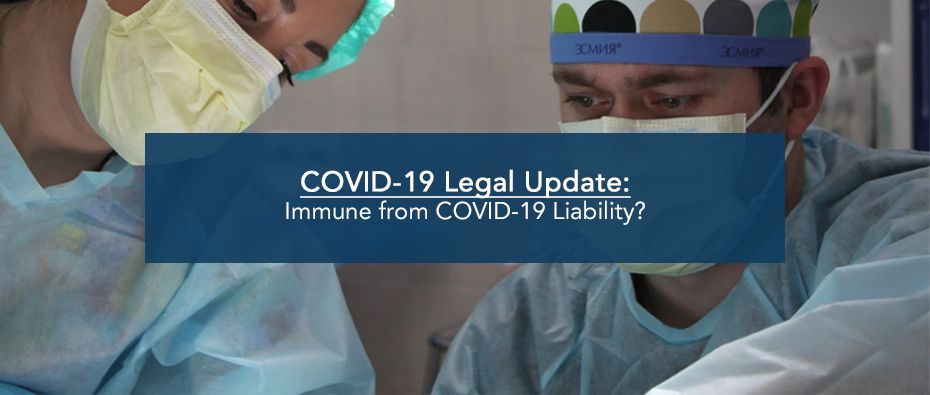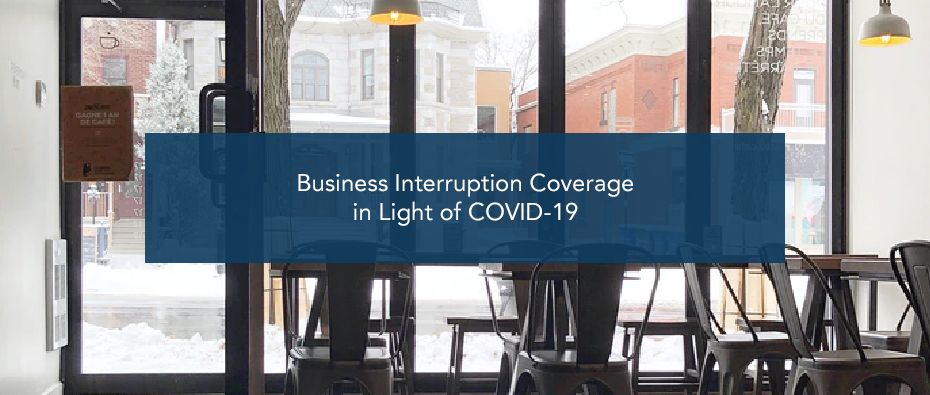Immune from COVID-19 Liability?
The evolving pandemic response continues to produce a plethora of legal issues. One such issue is whether to provide legal immunity to certain industries from COVID-19 related litigation. For health care providers and nursing home operators, legal immunity would stop claims resulting from acts taken and medical decisions made when providing care for somebody with confirmed, and presumed positive, cases of COVID-19. For business owners, legal immunity would halt claims brought by patrons who potentially contracted COVID-19 on their premises and/or from their services. Industry representatives and trade organizations/associations have already voiced their concerns about COVID-19 related litigation. For example, the Florida Chamber of Commerce, Florida Hospital Association, Associated Industries of Florida, Florida Justice Reform Institute, and a number of other trade associations sent a letter requesting legal immunity from civil and criminal liability resulting from treating COVID-19 patients.
On the federal level, The U.S. Chamber of Commerce, National Association of Manufacturers, and National Federation of Independent Businesses all recently sought legislation to shield their members from liability where certain health and safety guidelines are followed.
State Legislation:
States are already seeking to provide a shield from COVID-19-related claims for certain industries.
- Utah recently enacted legislation to immunizes business owners “from civil liability for damages or an injury resulting from exposure of an individual to COVID-19” on their premises.
- New York passed the Emergency Disaster Treatment Protection Act, which provides immunity to hospitals, nursing homes, physicians and nurses, and other health care providers for malpractice and negligence in the treatment of COVID-19 patients.
- Pennsylvania (by Executive Order), Wisconsin, and North Carolina have also codified laws which provide legal immunity to certain industries.
This trend towards state-level legal immunity for businesses, the healthcare industry, and the nursing home industry is growing and many other States have indicated a willingness to entertain such legislation in the short term. For example, while nothing has been filed yet in Florida, State Senator Jeff Brandes has already indicated that he would be introducing legislation which will provide a safe harbor for businesses which follow recommended guidelines.
Federal Legislation:
Congress has also been contemplating legal immunity from COVID-19 related litigation. United States Senator Ben Sasse just recently introduced a bill which seeks to limit liability for actions taken by health care providers to combat COVID-19. While not necessarily legal immunity or a limitation of liability, United States Congressman Andy Biggs has also introduced a bill which would have a similar effect. Congressman Bigg’s bill provides that the act of opening a business (by itself) is not negligent within the context of federal civil actions that include a claim alleging negligence arising from the transmission of COVID-19.
High ranking government officials have also issued their support for legal immunity. Senate Majority Leader Mitch McConnell has indicated that a broad liability shield will be a top priority in the next COVID-19 relief package. When questioned about Senate Majority Leader McConnell’s proposal, President Donald Trump indicated he would support such legislation.
This trend towards granting legal immunity does not seem to be ending anytime soon. As a claimant, it is essential to know if your potential defendant is afforded immunity by state or federal law. Conversely, businesses and other industries covered by immunity laws must be aware of the procedures to be followed in order to keep said immunity.
Business Interruption Coverage Update:
As noted in our previous blog post, COVID-19 business interruption coverage has become a heavily contested issue. Multiple cases have been filed in both state and federal courts throughout the United States. While many have not yet reached a resolution, some courts have determined these cases on their merits. For example, the United States District Court in and for the Southern District of New York recently found that COVID-19 did not cause direct physical loss or physical damage to property. Therefore, there were no business interruption damages. See Social Life Magazine Inc. v. Sentinel Insurance Co. Ltd. (Case no.: 20-cv-3311-VEC, S.D. N.Y.). This decision represents the first significant victory for insurance carriers and will likely be cited in business interruption cases.
If you have any questions about legal immunity legislation and its effect on you, please feel free to contact our attorneys at (305)416-3180.


